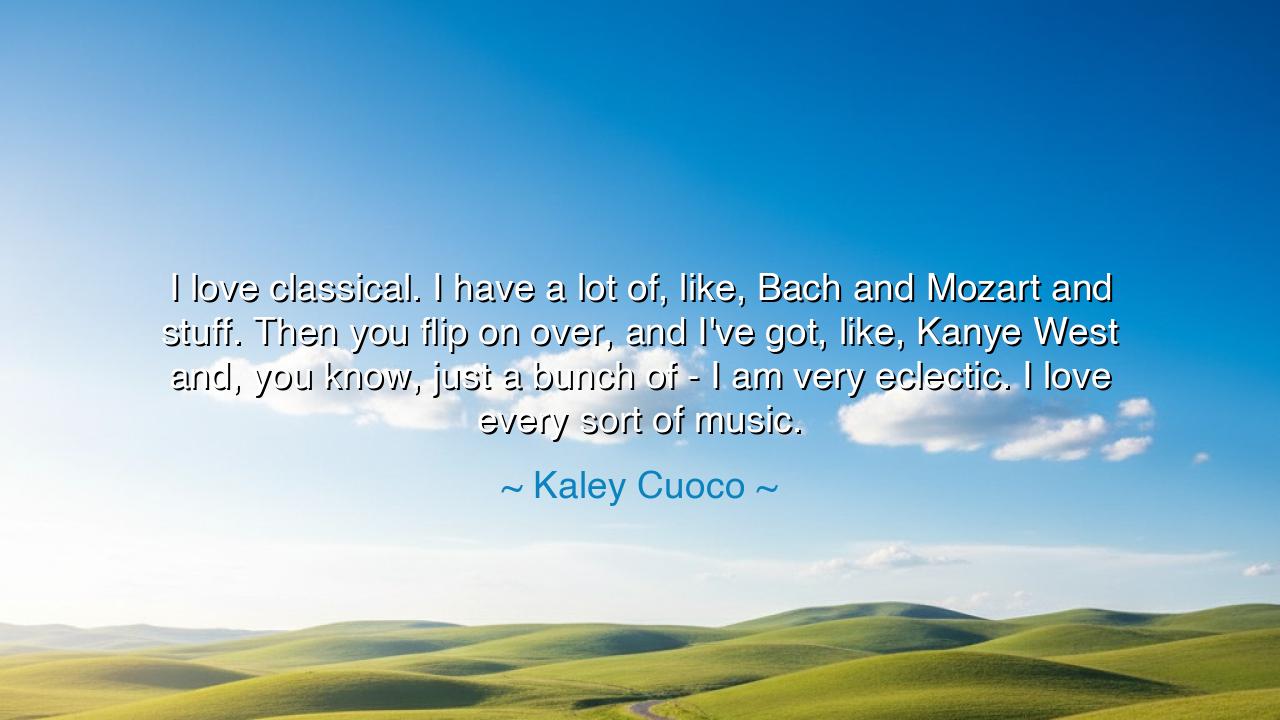
I love classical. I have a lot of, like, Bach and Mozart and
I love classical. I have a lot of, like, Bach and Mozart and stuff. Then you flip on over, and I've got, like, Kanye West and, you know, just a bunch of - I am very eclectic. I love every sort of music.






Hear the words of Kaley Cuoco, who in her candor revealed a truth of the ages: “I love classical. I have a lot of, like, Bach and Mozart and stuff. Then you flip on over, and I've got, like, Kanye West and, you know, just a bunch of—I am very eclectic. I love every sort of music.” Though spoken lightly, these words carry within them a treasure of wisdom—that the human soul is vast, and its joy is multiplied when it embraces diversity without fear.
When she names Bach and Mozart, she honors the timeless architects of harmony, the masters whose notes still echo through the centuries. They represent order, structure, discipline, and the sublime heights of human creativity. To love them is to connect with the great river of tradition, to listen to the voices of those who carved pathways of beauty long before we were born. This is the wisdom of continuity: the knowledge that some works endure because they touch the eternal.
Yet, in the same breath, Cuoco speaks of Kanye West and the modern currents of music, which pulse with innovation, rebellion, and the raw cry of the present age. These sounds are different from Bach and Mozart, yet they too are expressions of the human spirit—urgent, unpolished at times, but alive with immediacy. By embracing both, she reveals the heart of her eclectic nature: that truth and beauty may wear many faces, and each deserves to be honored in its time.
History bears witness to this. Consider the city of Alexandria, where scholars gathered wisdom from every culture—the poetry of the Greeks, the sciences of the Egyptians, the philosophies of the East. Their library became the light of the world, because it did not cling to one voice alone but welcomed all. So too does Cuoco’s love of every sort of music echo this ancient truth: that greatness lies not in exclusion, but in the embrace of many voices.
To be eclectic is not to be lost or scattered—it is to be rich, to be wide as the horizon. Just as the body thrives on many foods, the spirit thrives on many sounds. The solemnity of a requiem, the playfulness of a symphony, the fire of a hip-hop beat, the intimacy of a folk song—all are colors in the great palette of existence. The one who loves them all walks with a heart both humble and vast.
But let us be clear: this teaching is not only about music, but about life. For music here is a symbol of experience itself. If you close yourself only to what is familiar, you will grow narrow, brittle, easily broken. But if you open yourself to the new, the different, the surprising, you will become resilient, adaptable, wise. Diversity of music, like diversity of thought, is the guardian of freedom.
Therefore, O listener, take this lesson into your daily walk: do not confine your spirit to a single note. Explore, listen, expand. Seek both the voices of the past and the cries of the present. Let your heart move from Mozart to Kanye, from the concert hall to the street corner, and rejoice in the truth that each is a thread in the same tapestry. For to embrace all is to live fully, to feel deeply, and to understand the vastness of the human soul.
Thus remember Kaley Cuoco’s words: love every sort of music, for in doing so, you learn to love every sort of life. Let your ears, and your heart, be open. In eclecticism there is not confusion, but wholeness; not weakness, but abundance. And in this way, your days will become a symphony—sometimes classical, sometimes modern, always alive.






AAdministratorAdministrator
Welcome, honored guests. Please leave a comment, we will respond soon